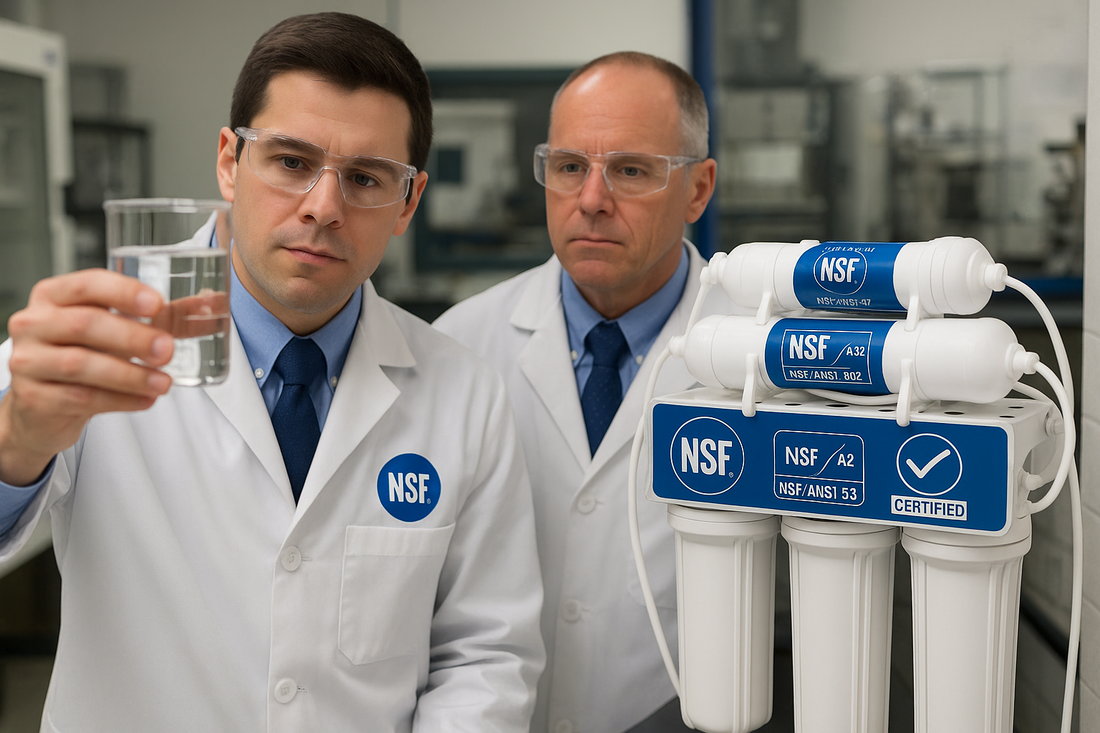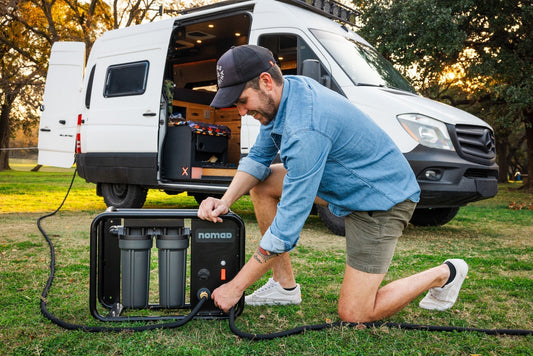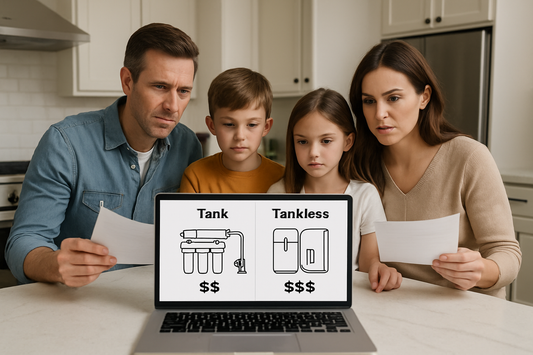Quick Answer: NSF water filter certifications verify that your filter actually removes the contaminants it claims to eliminate. Look for NSF/ANSI 42 (taste/odor), 53 (health contaminants), 58 (reverse osmosis), or 401 (emerging contaminants) marks to ensure independent third-party testing has confirmed performance claims.
When shopping for a water filter, you'll encounter countless brands making bold claims about contaminant removal. But how do you know which filters actually deliver on their promises? This is where NSF water filter certifications become your most reliable guide to making an informed purchase decision.
What Makes NSF Water Filter Certifications Different
The National Sanitation Foundation (NSF) operates as an independent, non-profit organization that has been setting public health standards since 1944. Unlike manufacturer claims or marketing promises, NSF certification for water filters requires rigorous third-party testing, ongoing facility inspections, and continuous quality monitoring.
NSF tips for water filter selection: Always verify certification numbers on the official NSF database before purchasing. Counterfeit certification marks exist in the marketplace, making verification essential for your family's safety.
The NSF Certification Process Explained
Getting NSF water industry product certification isn't simple. Manufacturers must submit their filters for comprehensive testing that includes:
- Material safety analysis to ensure no harmful substances leach into water
- Performance testing under controlled laboratory conditions
- Manufacturing facility inspections and quality control audits
- Ongoing monitoring to maintain certification status
This thorough process explains why NSF certified water filters often cost more than uncertified alternatives – you're paying for verified performance, not just marketing claims.
Understanding the Four Key NSF Water Filter Standards
NSF/ANSI Standard 42: Aesthetic Effects
This standard addresses non-health-related water quality issues like chlorine taste and odor. Filters meeting this standard improve your water's palatability but don't necessarily remove health-threatening contaminants.
Best for: City water users primarily concerned with taste and smell improvements.
NSF/ANSI Standard 53: Health Effects
The most critical standard for health protection, Standard 53 certifies removal of specific health-related contaminants including lead, mercury, VOCs, and cysts like cryptosporidium.
Best for: Homes with known contamination issues or those seeking maximum health protection.
NSF/ANSI Standard 58: Reverse Osmosis Systems
Specifically designed for RO systems, this standard verifies reduction of total dissolved solids (TDS) and other contaminants that reverse osmosis technology targets.
Best for: Areas with high TDS levels or comprehensive contaminant removal needs.
NSF/ANSI Standard 401: Emerging Contaminants
The newest standard addresses pharmaceuticals, hormones, and chemicals like BPA that traditional testing didn't cover but are increasingly found in water supplies.
Best for: Health-conscious consumers wanting protection from modern contaminants.

How to Verify NSF Water Filter Certifications
Authentic NSF certification includes specific elements you can verify:
- Official NSF Mark: Look for the distinctive NSF logo with the standard number (e.g., "NSF/ANSI 53")
- Certification Number: Each certified product receives a unique identifier
- Online Verification: Check the NSF database at nsf.org using the product name or certification number
- Specific Claims: Legitimate certifications list exactly which contaminants are reduced and by what percentage
Warning Signs of Fake Certifications:
- Vague claims like "NSF tested" without specific standard numbers
- Missing certification numbers or inability to verify online
- Claims of removing contaminants not listed in official NSF documentation
Choosing the Right NSF Certification for Your Needs
For City Water Users
If you receive treated municipal water, focus on NSF/ANSI 42 for taste improvement and NSF/ANSI 53 for removing chlorine byproducts and potential lead from plumbing.
For Well Water Users
Private well owners should prioritize NSF/ANSI 53 certified systems that address specific contaminants identified in their water testing results.
For Maximum Protection
Health-conscious consumers may want filters certified to multiple standards, including the newer NSF/ANSI 401 for emerging contaminants.
Consider exploring whole house water filtration systems that can address multiple water quality concerns simultaneously, or browse our collection of NSF certified water filters to find the perfect match for your specific needs.

Image by megafilm
The Investment Value of NSF Certified Systems
While NSF water filter certifications typically increase product costs by 15-30%, this investment provides:
- Verified Performance: Independent confirmation that your filter works as advertised
- Health Protection: Confidence in contaminant removal capabilities
- Long-term Value: Reliable operation and consistent performance over time
- Peace of Mind: Third-party validation of safety and effectiveness
Many homeowners discover that certified systems actually provide better long-term value through consistent performance and fewer replacement needs.
Making Your Final Decision
When evaluating NSF water filter certifications, match the certification type to your specific water quality concerns. Don't assume that more certifications automatically mean better filtration – focus on certifications that address your actual water problems.
Consider your household's water usage patterns, budget constraints, and maintenance preferences when selecting from certified options. The right NSF certified water filter provides years of reliable service while protecting your family's health.
Frequently Asked Questions
What does NSF certified water filter mean exactly? NSF certification means an independent organization has tested and verified that the water filter removes specific contaminants as claimed. It provides third-party confirmation of performance beyond manufacturer promises.
How can I tell if my water filter certification is real? Verify authenticity by checking the NSF online database using the product name or certification number. Real certifications include specific NSF marks, standard numbers, and detailed contaminant reduction claims.
Do I need multiple NSF certifications on my water filter? Multiple certifications aren't always necessary. Choose certifications that address your specific water quality issues based on testing results or known local water problems rather than collecting certifications.
Are NSF certified water filters worth the extra cost? Yes, for most households. The 15-30% price premium provides verified performance, health protection, and long-term reliability that often exceeds the value of cheaper, unverified alternatives.





